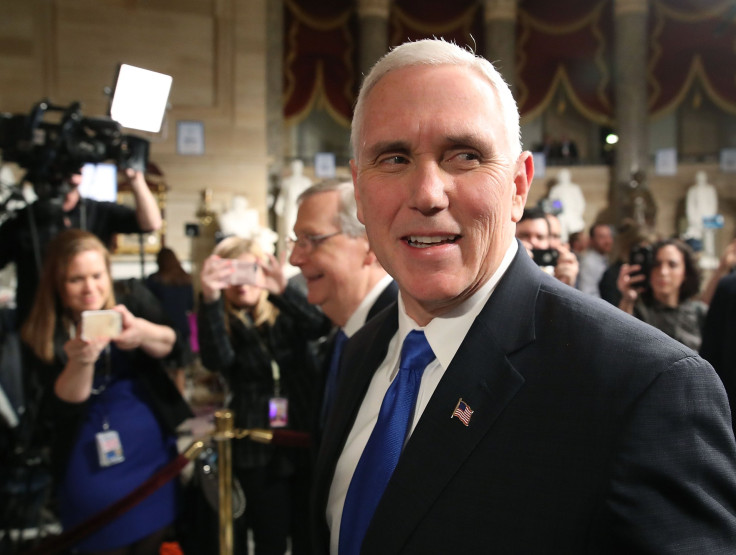Financial Lobby Group Pressed Vice President Mike Pence To Repeal Consumer Protection Rule

Vice President Mike Pence this week cast the deciding vote to kill a federal rule protecting consumers' right to file class action lawsuits -- delivering a big win for a financial industry trade association that has been directly lobbying him on the issue, according to documents reviewed by International Business Times. In the lead up to the Republican’s tie-breaking vote, the American Financial Services Association said Pence’s office requested ideas about how to defang the Consumer Financial Protection Bureau (CFPB), which had originally created the rule.
Earlier this year, the CFPB finalized its rule -- first proposed under the Obama administration -- to prohibit financial firms from requiring customers to relinquish their rights to file consumer class action lawsuits. At the time, the agency said its research showed that these “pre-dispute arbitration agreements are being widely used to prevent consumers from seeking relief from legal violations.”
Throughout 2017, financial giants mounted a campaign to rescind the rule. As part of that pushback, AFSA -- which describes itself as “the primary trade association for the consumer credit industry” -- delivered a nine-point regulatory reform plan to Pence's top economist Mark Calabria, who was appointed to his position in the vice president’s office from a job at the libertarian Cato Foundation.
In its letter, AFSA noted that in a meeting with Pence’s office weeks after he assumed office, the vice president’s advisers had specifically asked the group to provide “reforms that the Consumer Financial Protection Bureau could implement quickly to reduce unnecessary burdens on financial institutions.” AFSA’s blueprint pressed Pence to push for a moratorium on the CFPB’s consumer complaint database; rescind orders that “direct banks and nonbanks to ensure that their service providers are in compliance with applicable laws”; and terminate the rule that outlaws financial institutions from requiring customers to agree to forced arbitration clauses that block them from joining class action lawsuits.
“The CFPB should not finalize the proposed arbitration rule that would prohibit the use of class action waivers,” the group wrote to Calabria, echoing its separate 2016 letter to federal regulators demanding they back off the rule. “The CFPB’s own study shows that arbitration is inexpensive, fast, and beneficial to consumers.”
Less than seven months after AFSA met with Pence's office, the Republican vice president followed through on the group’s recommendations, casting the decisive Senate vote killing the CFPB arbitration rule.
Before Pence’s tie-breaking vote, federal records show, AFSA directly lobbied Pence on a host of issues, including the issue of arbitration. In all, the records show the group directly lobbying Pence on arbitration during the first three quarters of the year, spending $375,000 in total on all its efforts to influence lawmakers.
Pence’s vote was no surprise -- he has been outspoken in his support of Republican efforts to dismantle reforms passed in the wake of the 2008 financial crisis. Earlier this year, his economist, Calabria, declared that “Since so much of the Obama-era financial regulation was by guidance -- and, I would say, regulation by enforcement -- that part of the Obama era can be easily erased once we have new regulators in place.”
Pence's support for deregulation has coincided with his reliance on the financial industry as a significant source of campaign cash. During his time in Congress, he raised more than $250,000 from donors in the banking and lending industries, according to data compiled by the Center for Responsive Politics. He raised an additional $261,000 during his campaigns for governor, according to data from the National Institute on Money In State Politics.
© Copyright IBTimes 2024. All rights reserved.












